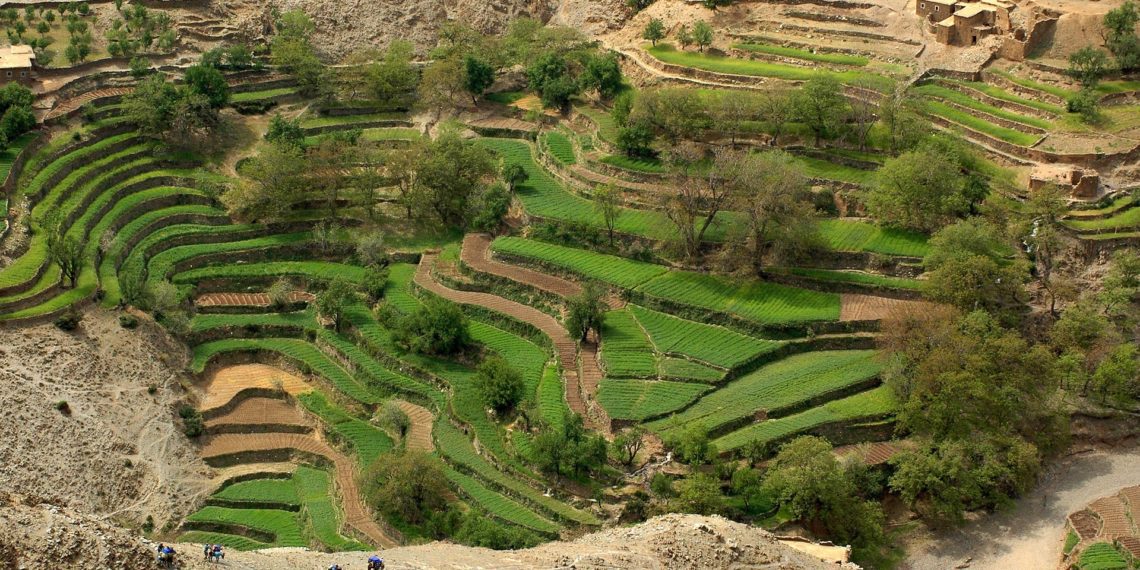The future of the planet, as well as the economy and civilization of Morocco, depend heavily on agriculture. A sizeable section of the population is employed in the sector, which also contributes significantly to the GDP of the nation. Furthermore, agriculture plays a significant role in Morocco’s export economy and in ensuring the country’s food security.
Morocco is fortunate to have a diversity of temperatures and topographies, which enable the cultivation of a wide range of crops. As well as its livestock and fisheries, the nation is renowned for the production of citrus fruits, olives, and vegetables. Morocco has recently increased its attention on organic and ecological agricultural methods while simultaneously increasing the output of other commodities including cereals and soybeans.
The effects of climate change are one of the biggest problems Moroccan agriculture is experiencing. Droughts are occurring more frequently and severely in the nation, which is impacting food harvests and straining water supplies. The frequency of extreme weather phenomena, such as floods and storms, is also having an impact on agricultural production.
Morocco has been putting into action a number of steps to strengthen the resilience of its agricultural industry in order to solve these issues. The adoption of drought-tolerant crops should be encouraged, irrigation infrastructure investments should be made, and sustainable farming methods should be put into practice. To help farmers lessen the financial effects of crop failures, the Moroccan government is also aiming to increase agricultural insurance for farmers’ access and affordability.
The need to boost production and competitiveness is another major issue facing Moroccan agriculture. The need for food is rising quickly along with the nation’s population. The need for food is also anticipated to rise as a result of the predicted growth in the world’s population. Moroccan agriculture must become more effective and productive to meet this demand.
Morocco is spending money on R&D to increase crop yields and quality in order to address this issue. The nation is also attempting to increase the effectiveness of its agricultural supply chain through infrastructure and logistics investments as well as by encouraging the adoption of cutting-edge technology like precision agriculture. In order to ensure that farmers have the abilities and information necessary to prosper in the contemporary agricultural environment, Morocco is also aiming to promote agricultural education and training.
In addition to these difficulties, agriculture has negative effects on the environment and society. Like agriculture everywhere else, Moroccan agriculture has a big impact on the environment, especially on water resources and biodiversity. Additionally, due to the usage of chemicals and pesticides, agriculture can have a detrimental effect on the local population’s health and ability to support themselves.
Morocco is pushing the adoption of sustainable farming methods, such as organic farming and agroforestry, to address these problems. As well as promoting the use of ecologically friendly inputs like biopesticides and organic fertilizers, the nation is aiming to limit the use of pesticides and other chemicals in agriculture. Morocco is also making efforts to guarantee that the advantages of agriculture are distributed more fairly across all sections of society, especially women and underprivileged groups.
In conclusion, agriculture is crucial to the future of the planet, the Moroccan economy, and Moroccan society. Numerous challenges must be overcome by the sector, including those caused by climate change, the need to increase productivity and competitiveness, and the need to address how agriculture has an adverse impact on the environment and society. With the right policies and investments, Morocco can, however, overcome these challenges and create a more equitable, fruitful, and sustainable agricultural sector that will help feed a growing global population.





